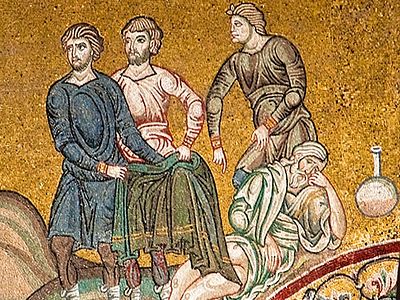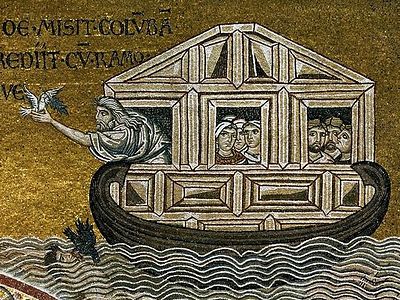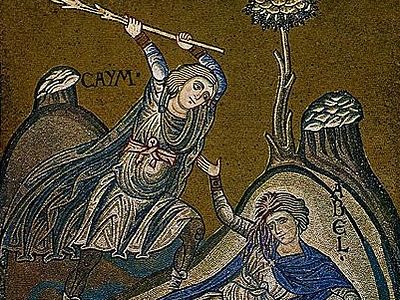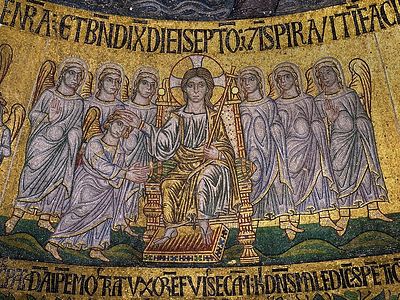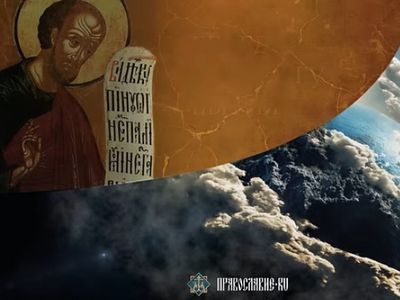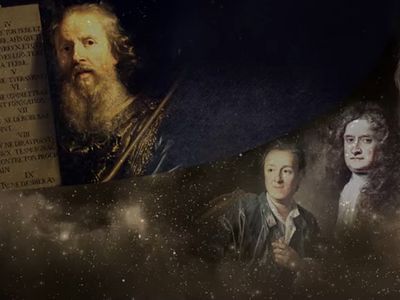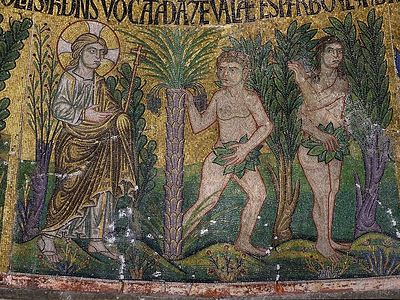Part 7. On the Origin of Nationalities and the Sin of Ham
Continuing his cycle on the book of Genesis, historian and sectologist Andrei Ivanovich Solodkov speaks about what should above all transform a man—the surrounding world or himself; why the Lord punished Babel; about the bloody star gods of Babel and their “influence” on modern life; and on ungodly unity and unity in God.
Man, change thyself!
Although God destroyed the perverted pre-Flood civilization (we spoke about this in the previous conversation), sin continued to exist. This is the answer to those who ask, “If God exists, then why doesn’t He bring order?” As we see, He imposed order from a position of righteousness and strength, but external change did not make man more noble. Degraded human nature needs healing from the inside out, and therefore all external changes of the political world order, thanks to which mankind supposedly attains the fullness of happiness and prosperity on the earth, are but deception and illusion. There are more successful political systems, there are worse, and there are those that are absolutely useless. But the reason for the disorder is in us. Everything is topsy-turvy for us. We demand love, respect, courtesy, and patience from others, but Christ teaches to demand this from ourselves. And not only with words, but by His very life He teaches us sacrificial love. There is no such commandment, to demand love from others, but there is, Love thy neighbor… (Mt. 22:39). As long as we have no faith, trust, and love for God, we will be running in circles.
However, all the same, the fullness of order will not be on Earth. But man has the desire for absolute purity. It is inherent in him from creation. “The soul is Christian by nature” (Tertullian), and the law in the soul is the conscience. The conscience, according to teaching of Abba Dorotheos, is “something Divine and never perishes,” and, “there is no man without a conscience.” “When God created man He sowed in him something Divine,” the saint teaches, “a certain thought which has in itself, like a spark, both light and warmth; a thought which enlightens the mind and indicates to it what is good and what is evil—this is called conscience, and it is a natural law.”1
Absolutely purity is possible only in the Heavenly Kingdom, but the desire for it in this life transfigures a man, making him purer through repentance. In this way, in this striving for Heavenly purity, a Christian spreads his light upon people and all the surrounding world. Let your light so shine before men, that they may see your good works, and glorify your Father which is in heaven (Mt. 5:16). If you all sought to change yourselves with Divine help, it would require no external, imaginary prosperous world political systems, upon which we so vainly rely. People would become simpler, and where there is simplicity, in the expression of St. Ambrose of Optina, “there are a hundred Angels, but where there is cleverness—there are none.” And the state system would become better.
Thus, the external post-Flood changes to the surrounding world did not abolish sins, which are deeply rooted in the hearts of man. It would seem that with all villains destroyed, life on earth would begin anew with a clean slate. Righteous Noah left the ark with his three sons. Finally, everything was just, and goodness had triumphed… However…
The sin of Ham was not slow to appear. Sin enslaves a man, and here we meet for the first time in the Bible the expression “slave of sin,” which one of the sons of Noah—Ham—became. Blessed Augustine writes the following in this regard: “The state of slavery is rightly appointed for the sinner. In Scripture we do not find a slave before Righteous Noah punished the sin of his son with this name. Thus, not nature, but sin deserved this name.” Know ye not, that to whom ye yield yourselves servants to obey, his servants ye are to whom ye obey; whether of sin unto death, or of obedience unto righteousness? (Rom. 6:16).
Note: In the tenth chapter of Genesis it says that the head of the grandiose Tower of Babel construction, Nimrod, was a descendant of Ham (cf. Gen. 10:6-10).
“Higher, and higher, and higher…”
Let’s read further in the eleventh chapter of Genesis:
And the whole earth was of one language, and of one speech. And it came to pass, as they journeyed from the east, that they found a plain in the land of Shinar; and they dwelt there. And they said one to another, Go to, let us make brick, and burn them thoroughly. And they had brick for stone, and slime had they for morter. And they said, Go to, let us build us a city and a tower, whose top may reach unto heaven; and let us make us a name, lest we be scattered abroad upon the face of the whole earth (Gen. 11:1-4).
As we see, there was one tongue and one speech. People understood one another without a translator. Borders were erased—it was cosmopolitanism! But such unity didn’t bring people happiness. Why? The stimulus for the construction of the Tower of Babel was the idea of “unity for the sake of unity,” and the desire “to make a name.” People began to create their own civilization without God, their own political structure, based on the ideology of self-exaltation. One of Nimrod’s reasons for constructing the tower was nothing other than perpetuating “his name” in his descendants, to gratify his pride and vanity: “Look how human nature does not love to remain within its boundaries… This especially destroys people… Addicted to worldly possessions, even when we have great wealth and power… they endeavor to rise higher and higher,” writes St. John Chrysostom.
Recall how God concluded a covenant with Noah and gave the commandment and blessing to spread over the entire face of the earth, promising there will be no more floods. But people acted as they wantes. They built a tower reaching up to heaven, reasoning, “Even though God said there wouldn’t be a flood … what if there is one?” We have to play it safe. They did not come to their senses by the punishment of the flood; they had no intention of changing, but decided to continuing acting as they wanted—to sin, and if there would be a flood, then to save themselves it would be enough to change the surrounding world, for example, to build a high tower “to heaven,” climb up there, and continue to live according to their own desires.
Modern man has not gone far from the builders of Babel. Today we reason the same way: “What’s written in the Bible? Oh, come on!... What do they say in the Church? Sin begets death? Ok, we get it—the clergy’s job is to scare the people, but we will do what seems best to us.” The Church warns about the danger of experimenting on producing surrogate people, trying to stop the infanticide of unborn children, but man acts according to the principle, “while no thunder’s crashing…”2
But, it would seem, the thunder has struck, and recollections of the flood are still alive in the Babylonians, but man persists. God says to spread across the whole face of the earth. But man creates a huge metropolis. As before, so today. Here it’s crowded, and there’s shoving in lines and standing in traffic. And man makes his way through the jungle of civilization, exhausted by his artificial world, his idea of imaginary freedom and an imaginary meaning for life, walled up in a concrete cave with a gas burner, sitting at the “substitute for nature” of the television, looking for rest and comfort, but falling into the same trap of the hustle and bustle—only now the human soul is devastated by information overload.
I’ve been to Sakhalin on a missionary trip. You fly for nine hours without a layover. Under the wings of the plane you see forests, rivers, lakes, fields… And the thought involuntarily arises: To whose advantage is it to build up Moscow and not the rest of the country?
Those who built the Tower of Babel acted according to this principle—higher, and higher, and higher…
The seventy-year experience of the builders of ghastly communism has, unfortunately, taught us little. Of course, the Church is not persecuted now, but the desire to please both God and mammon can be seen in the attempts to build a consolidated society. As the old soviet-era song went, “We are born to make a dream come true… and replace our heart with a fiery motor.” This seventy-year construction showed everyone, to put it mildly, the absurdity of such building. It all collapsed. And everything that’s being constructed in the same way is doomed to destruction. Therefore whosoever heareth these sayings of mine, and doeth them, I will liken him unto a wise man, which built his house upon a rock: And the rain descended, and the floods came, and the winds blew, and beat upon that house; and it fell not: for it was founded upon a rock. And every one that heareth these sayings of mine, and doeth them not, shall be likened unto a foolish man, which built his house upon the sand: And the rain descended, and the floods came, and the winds blew, and beat upon that house; and it fell: and great was the fall of it (Mt. 7:24-27). And it is all because man became the object of worship instead of God, revealing all the madness of such an undertaking. A mad man is he who says in his heart, there is no God (Ps. 13:1).
Bloodstained stars
We read further in the book of Genesis:
And the Lord came down to see the city and the tower, which the children of men builded. And the Lord said, Behold, the people is one, and they have all one language; and this they begin to do: and now nothing will be restrained from them, which they have imagined to do (Gen. 11:5-6).
What did the Babylonians do? Creating their world and not trusting God, they created their own religion—astrology. “If a man stops believing in God, he begins to believe in everything else,” says Feodor Dostoyevsky.
People began to invent a self-made religion—of course, not without the prompting of the devil.
During the heyday of the Chaldean-Babylonian civilization, they built a gigantic ziggurat in the Mesopotamian Valley. “Chaldean priests watched the starry heavens from these towers and plotted maps of the locations of the heavenly bodies. They believed that the sun, moon, planets and stars were gods, able to magically affect the fate of the world and of every man individually, and believed that if they managed to understand and predict the motion of the heavenly bodies, they would be able to predict the future. Astrology of this kind is called vulgar, or primitive astrology. The main principle of vulgar astrology is that the position of things on earth and trends in the development of events correspond to the configuration of celestial bodies. The astrological beliefs of the religion of Canaaan, itself an offshoot from the Mesopotamian religion, were closely associated with the worship of gods such as Baal (Bel, Moloch), Astarte (Ishtar), and Remphan, identified respectively with the sun, moon, and Saturn” (Biblical Encyclopedia).
Archaeologists have held excavations in these places, and they have discovered thousands of skulls of infants offered in sacrifice to these star gods. The Babylonian religion had a principle: to decipher by the stars which children were pleasing to the gods and which weren’t. Some were offered in sacrifice as unwanted and useless for society, and others to appease the gods and avert their wrath.
How and what to do when depended on the location of the stars. And, as the Babylonian tablets bear witness, during these slaughters they would engage in orgies with whomever they could grab.
The apostle Paul writes about the reason for this madness in his epistle to the Romans:
Because that, when they knew God, they glorified him not as God, neither were thankful; but became vain in their imaginations, and their foolish heart was darkened. Professing themselves to be wise, they became fools, and changed the glory of the uncorruptible God into an image made like to corruptible man, and to birds, and fourfooted beasts, and creeping things. Wherefore God also gave them up to uncleanness through the lusts of their own hearts, to dishonour their own bodies between themselves: Who changed the truth of God into a lie, and worshipped and served the creature more than the Creator, who is blessed for ever. Amen. For this cause God gave them up unto vile affections: for even their women did change the natural use into that which is against nature: And likewise also the men, leaving the natural use of the woman, burned in their lust one toward another; men with men working that which is unseemly, and receiving in themselves that recompence of their error which was meet. And even as they did not like to retain God in their knowledge, God gave them over to a reprobate mind, to do those things which are not convenient; Being filled with all unrighteousness, fornication, wickedness, covetousness, maliciousness; full of envy, murder, debate, deceit, malignity; whisperers, Backbiters, haters of God, despiteful, proud, boasters, inventors of evil things, disobedient to parents, Without understanding, covenantbreakers, without natural affection, implacable, unmerciful: Who knowing the judgment of God, that they which commit such things are worthy of death, not only do the same, but have pleasure in them that do them (Rm. 1:21-32).
It's interesting that modern people have, for some reason, raised this ancient pagan Babylonian religion, satanic in essence and connected with human sacrifice, to the level of innocent fun. Astrology is not science. Astronomy is science, but astrology is a pagan religion. So why in a secular state is it ranked as if it were a dominant religion?! For example, for a person to register on the social network mail.ru, a zodiac sign is immediately given to him, and without his consent. And if by the same principle, but following instead the Church calendar, a person registered in the same social network, would be reminded, and not him only but also by his friends, which saint he is named after and when his name’s day is, imagine what ruckus there would be in the media! People would be yelling about freedom of conscience, and about “insulting the feelings of unbelievers”; but when it comes to the zodiac—nothing. They made me a pagan; they decided for me, and in fact it’s the same as if they had roped me into a marriage against my will. But shut up, they say, this is science. How did it happen that we live in a country where astrology—an ancient misanthropic pagan religion—has won out over Christianity in social spheres?
And what’s so surprising? We also kill children in the mother’s womb—the unborn! Nothing has changed since those ancient times—just instead of Baal and Astarte, people began to worship the dollar and the euro. And instead of the stars of Remphan—comfort. They say, “Why should I give birth? I want to live for myself.” They kill children for the sake of temporary happiness!...
God instructs us to eschew such pseudo-religious experiments: And lest thou lift up thine eyes unto heaven, and when thou seest the sun, and the moon, and the stars, even all the host of heaven, shouldest be driven to worship them, and serve them… There shall not be found among you any one that maketh his son or his daughter to pass through the fire, or that useth divination, or an observer of times, or an enchanter, or a witch. Or a charmer, or a consulter with familiar spirits, or a wizard, or a necromancer. For all that do these things are an abomination unto the Lord (Deut. 4:19, 18:10-12). And again: Therefore hearken not ye to your prophets, nor to your diviners, nor to your dreamers, nor to your enchanters, nor to your sorcerers, which speak unto you, saying, Ye shall not serve the king of Babylon: For they prophesy a lie unto you, to remove you far from your land; and that I should drive you out, and ye should perish (Jer. 27:9-10).
How reliable are the predictions about our futures by horoscopes, in which the curious so eagerly believe?
Senior researcher of the State Astronomical Institute of P. K. Sternberg and associate professor of the physics department at Moscow State University, B. G. Surdin writes in one of this works, “The position of the zodiac signs is displaced in relation to the constellations about 30 degrees, or one constellation. This is due to the fact that the canonical rules of astrology were established two thousand years ago in the works of the ancient Greek scholars. Since then, as a result of the movement of the earth’s axis relative to the plane of the Solar System (the phenomenon of precession), the system of heavenly coordinates has shifted relative to the stars. Therefore, now when the sun is located in the Taurus constellation, astrologists believe that it is in the sign of Gemini.”
In 1981 the Roman newspaper “Paeze Sera” published a debate between astrologists and astronomers, during which the scientists asked the fortunetellers one interesting question: “How do you compose a horoscope for those who were born in the north, in the Arctic Circle?” The fact is that for many months, the sky over the poles has no traditional astrological planets (they are below the horizon). It turns out that those born in the northern regions are deprived of characteristics and destiny! This dilemma did not receive any coherent answers from the astrologers.
The Lord did there confound the language of all the earth
Let’s return to Genesis and read:
Go to, let us go down, and there confound their language, that they may not understand one another's speech. So the Lord scattered them abroad from thence upon the face of all the earth: and they left off to build the city. Therefore is the name of it called Babel; because the Lord did there confound the language of all the earth (Gen. 11:7-9).
The Lord scattered the Babylonians across the whole face of the earth. Was this dispersal a punishment? Yes, but God’s punishment is always a desire to help man return from death to life. From this story we see the origin of the languages of the peoples of the world. We spoke about the origin of the nationalities in the last conversation.
“Confounding” is always a negative word. The word “Babylon” is also translated as “madness, insanity, rebellion, insane rebellion.” That is, this scattering occurred because of people’s insane rebellion and search for unity outside of God.
There are many theories about the origin of the languages of the peoples of the world: the theory of sign language, the theory of onomatopoeia, the theory of the creation of language by the power of the human mind—but these do not speak of the source which gave power to the mind. But none of these are able to explain the presence and richness of speech, which, unlike all other living beings, man alone possesses. Evolutionists speak about a gradual development of language. Some talk about a sudden change in man’s DNA that spawned languages. When you research all these theories, none of which have any scientific basis, you simply marvel at how much we have to be believers in chance and coincidence to affirm that theories, hypotheses, and myths are science.
Such unity as the unity of the Babylonians is not pleasing to God, but is soul-destroying for man. But is there an alternative, a different unity? Yes. On the day of Pentecost—the day of birth of the Church—the apostles spoke in the tongues of the peoples of the world (cf. Acts 2:3-4), proclaiming unity in Christ. “For in the confusion of the tongues [at Babel—A. S.], their plan was destroyed, for their plan was ungodly, but here their thoughts were confirmed and united because their intention was godly. Through that which is fallen, through the same is restoration,” says St. Cyril of Jerusalem.
***
And then the eleventh chapter of Genesis brings forth the generations of Shem. His family extends until Abram. And we read:
But Sarai was barren; she had no child. And Terah took Abram his son, and Lot the son of Haran his son's son, and Sarai his daughter in law, his son Abram's wife; and they went forth with them from Ur of the Chaldees, to go into the land of Canaan; and they came unto Haran, and dwelt there. And the days of Terah were two hundred and five years: and Terah died in Haran (Gen. 11:30-32).
We will speak more in detail about these events in the next conversation. For now, I will note that God rescues Abram and his family from this place so full of the passions—the Babel chaos (the word “Ur” is translated as “fire, vehemence, passion”)—and leads him into the land of Canaan—an image of the Church and of the Heavenly Kingdom.







